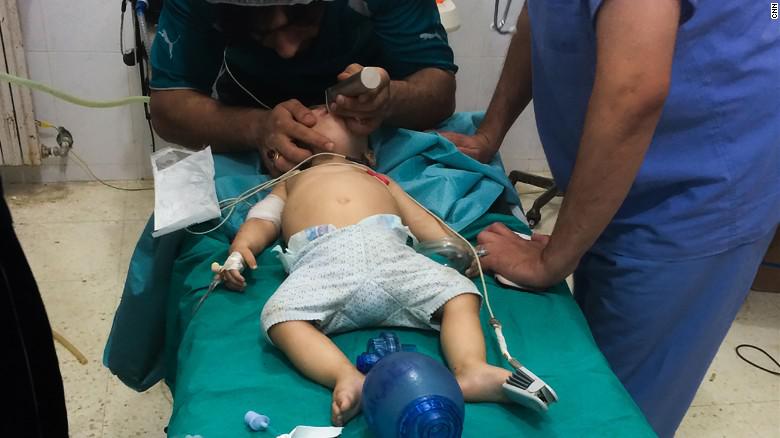
It took almost eight hours to get through the border crossing from Turkey to Syria but we were finally on our way, traveling in a two-car convoy down the Castello Road into the besieged city of Aleppo.
For me, this journey had begun months ago, on April 28, 2016, when I read of the death of Dr. Muhammad Waseem Maaz.
Dr. Maaz was one of the last pediatricians in the rebel-held section of Aleppo, where he served 400,000 people. He and 26 other medical staff and patients were killed in the bombing of Al Quds Hospital.
His death touched my soul.
I asked SAMS, the Syrian American Medical Society, if I could go to Aleppo to witness and testify to the city's devastation, and to bring at least a semblance of moral support to the beleaguered medical staff there, to stand hand-in-hand, in solidarity with my Syrian colleagues.
They were reluctant, because of the obvious safety issues, but I finally convinced them.
Shrapnel wounds
The trip into the city was uneventful except for two explosions, safely off in the distance. As we approached Aleppo, the wrecks of cars and trucks littered the road.
The most eerie sight was the canyon of empty, bombed-out buildings; these were once the homes of children and their families.
When we arrived at the M2 hospital, we were immediately escorted underground, and I walked into a waiting room filled with injured patients of all ages being triaged and tended to.
In the intensive care unit we saw a 10-year-old boy, who had been hit by shrapnel, leaving him with a severe chest and spinal cord injury, being intubated -- this would turn out to be a lifesaving procedure.
Before I left Aleppo, I visited his bedside. Although he had not regained consciousness, he was now breathing without machine support. But his prognosis is still grave -- in fact the prognosis for all the children of this besieged city is grave.
Over the next three days, I worked side-by-side with the medical staff of the M2 and M10 hospitals; we saw more than 200 children who had illnesses ranging from hepatitis to chicken pox to pneumonia.
Heroic staff
We had to hospitalize many kids because it was simply too dangerous to send them home for follow up care. Several newborns died of prematurity and infections. Because of the siege, we were not able to send them to a more comprehensive facility.
The heroic staff cared for several children with infections that could have proved fatal, were it not for their intervention and care.
I am still haunted by the thought of a group of children, pre-adolescents, brought to our evening clinic by their parents -- we were forced to see patients from 8pm until midnight because it is too dangerous to be out in the daylight.
These kids all had very similar complaints: they weren't sleeping or eating; they would cry at the sound of planes; they were hyper-vigilant and didn't want to leave their parents' sides -- they would fall apart whenever a parent left the room.
These are signs and symptoms associated with Post Traumatic Stress Disorder, but we were not able to offer them anything. Words of comfort can only go so far.
This war, this siege will produce an entire generation of children with anxiety disorders, children whose very childhoods have been stolen from them. No school, no play, soon to be no food. They will lack the very thing that children need most: a stable, predictable environment.
City under siege
The ride out of Aleppo was the scariest time of my life: We were under constant bombardment and the road was almost cut off at points. It was the only time I actually feared for my life. The destruction was beyond description. Block upon block was in total ruin.
But even though the physical destruction was unimaginable, the spirit and resilience of the people and the medical staff were up to the task.
Storekeepers would open for as long as they could. Kids would play with whatever they found; wherever was safe. Parents would bring kids into the doctor to obtain whatever modicum of services were available. Dr. Maaz would have been proud.
As I write this, the Castello Road has been cut off by regime forces, leaving rebel-held Aleppo under a complete blockade.
Without diesel fuel, the hospital generators won't run. Without the resupply of IV fluids and antibiotics, patients who might have been saved will die. Without food and water, those most at risk -- the elderly, the infirm, the chronically ill, pregnant women, sick newborns -- will suffer and will begin to die.
Dr. Maaz and his colleagues would be saddened, but work on.
By Dr. John Kahler - CNN
 FR
FR EN
EN AR
AR








